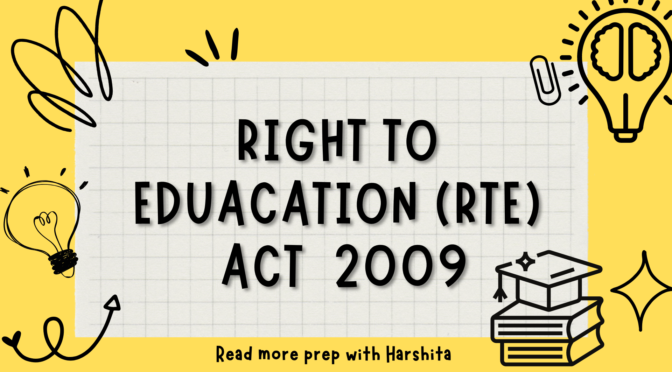The Right to Education (RTE) Act 2009 is a comprehensive legislation enacted by the Government of India with the aim of ensuring free and compulsory education for all children between the ages of 6 and 14.
The Right to Education (RTE) Act 2009 was formed by the Government of India. The legislation was enacted by the Parliament of India and received presidential assent on August 26, 2009. The RTE Act was passed as an amendment to the Constitution of India and is a result of the collective efforts of lawmakers, education experts, activists, and various stakeholders. The act was introduced with the objective of providing free and compulsory education to all children in the country between the ages of 6 and 14.
Here are the key provisions and details of the RTE Act 2009:
- Free and Compulsory Education: The RTE Act makes education a fundamental right for all children in the specified age group. It mandates that the government provide free education to all children and ensures their enrollment and attendance in schools.
- Disadvantaged Groups and Weaker Sections: The Act emphasizes inclusivity by reserving a certain percentage of seats in private unaided schools for children from disadvantaged groups, including Scheduled Castes (SCs), Scheduled Tribes (STs), and Other Backward Classes (OBCs). Additionally, it reserves seats for children from economically weaker sections (EWS) of society.
- Prohibition of Screening and Capitation Fees: The RTE Act prohibits schools from conducting any form of screening or entrance exams during the admission process. Schools are also prohibited from charging capitation fees or demanding donations during admission.
- Non-Discrimination: The Act ensures that schools do not discriminate against any child based on their gender, caste, religion, or socio-economic background. It prohibits any form of physical or mental harassment, corporal punishment, or expulsion on such grounds.
- Infrastructure and Teacher Requirements: The RTE Act sets certain norms and standards for infrastructure and facilities in schools. It specifies requirements for classrooms, toilets, drinking water facilities, playgrounds, libraries, and other amenities. Additionally, the Act outlines minimum qualifications for teachers and sets pupil-teacher ratio guidelines.
- Curriculum and Evaluation: The Act promotes a child-centric approach to education. It emphasizes a flexible curriculum that takes into account the child’s needs, potential, and diverse interests. Continuous and comprehensive evaluation methods are encouraged to assess the child’s progress and learning outcomes.
- School Management Committees (SMCs): The RTE Act mandates the establishment of School Management Committees in all schools. These committees comprise parents and guardians of children attending the school. SMCs play a vital role in monitoring school functioning, ensuring transparency, and facilitating community participation in education.
- Quality Standards and Monitoring: The Act emphasizes maintaining quality standards in education. It establishes mechanisms for monitoring school performance, teacher qualifications, and student learning outcomes. Regular inspections and assessments are conducted to ensure compliance with the prescribed norms.
- Implementation and Funding: The central and state governments are responsible for implementing the RTE Act. Adequate funding and resources are allocated to support the effective implementation of the Act. The government provides financial assistance to schools, including support for infrastructure development, teacher training, and other necessary interventions.
The RTE Act 2009 has had a significant impact on education in India, promoting inclusivity and access to quality education for all children. It aims to eliminate barriers to education, bridge educational disparities, and ensure that every child has an equal opportunity to develop their potential.
Also Read : PWD act

Also Visit: Prep with Harshita


best website to find colleges
Thanks for sharing. I read many of your blog posts, cool, your blog is very good.
Did you know that some schools still teach outdated information about sex and reproduction?